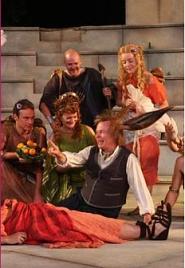A Midsummer Night's Dream - Open Air Theatre 2007
If the Open Air Theatre's Artistic Director, Ian Talbot, were to ask 'Does my Bottom look big in this?", we'd probably have to agree that it does. Though Talbot is not very tall or even very wide, his is still a very fine Bottom in this perennial at the Open Air Theatre.
Almost the ideal play to perform at this venue, Shakespeare's 'A Midsummer Night's Dream' gets reworked every two years or so to keep it fresh. New for this 75th anniversary season, this latest version is directed by Christopher Luscombe, with Talbot once more in the role of Nick Bottom, some 36 years after he first tackled it. And it may be the last time that we see Talbot in the role, at least at this venue, as he's relinquishing his position as Artistic Director at the end of the current season after 20 years in the top job.
Scary fairies in 'bovver' boots figured in last season's version of this play. Here, there's a softer note to both the characterisations of the fairies and their costumes which incorporate more than a hint of wings. So there's quite a marked contrast with what Luscombe and designer Janet Bird have come up with for this year's production. The setting is a kind of amphitheatre which fits the bill pretty well as Athens, but made me wonder just how it would transform to an enchanted forest. In the end, it was pretty easily archived - and with almost a wry smile - by the addition of a few clumps of grass implanted in the structure by means of a 'rude mechanical' device.
John Doyle, Artistic Director at the Watermill Theatre, Newbury, has been instrumental in developing the concept of having small ensembles playing instruments as well as acting in productions. This configuration has been taken up here by Christopher Luscombe, and the opening scene boasts an orchestra, members of which then down their musical tools and move fluidly into their characters.
Written about 1595, the plot of the 'Dream' almost borders on the Pythonesque, or even the insane, stretching the imagination with a peculiar mix of characters ranging from heads of state to fairies. Working somewhere between these two extremes is an additional band of characters - the 'rude mechanicals' - who are in the midst of rehearsing a play to present at the Duke of Athens' upcoming wedding. And it's love that figures prominently in the piece, with two sets of young lovers who can't seem to get the person they desire, a dispute between the fairy King and Queen in fairyland, and the impending nuptials of the Duke and Hippolyta in Athens. Still, everything works out happily ever after as one might predict from a play that is a fairytale as much as anything else.
Not a unique device in Shakespeare's work, there's a play within a play which provides the climax. This play by the 'mechanicals' offers directors and actors alike the chance to go 'over the top'. The trick is to make it look like you are going that far, but still keep tight control. It never ceases to amaze me how the same lines and framework, can yield such glaringly different outcomes. Nevertheless, Luscombe and his team have come up with a very funny reworking of this scene, with creative use of costumes, props and business, all perfectly orchestrated. And to demonstrate the opportunities this venue presents, when Talbot's Bottom (playing Pyramus) is finally dying and says "My soul is in the sky", another jet roared over making the audience giggle even more and prompting Talbot to wave to it - nice touch.
Chris Emmett showed his considerable worth in Macbeth earlier in the week as the 'knock-knock' porter, and does a fine job here too in the role of Peter Quince, the carpenter with a penchant for writing dramas as a sideline. Emmett provides a patient, unassuming Quince, almost the perfect counterpart to Talbot's ebullient Nick Bottom. Sara Woodward moves easily and convincingly between her double roles as Hippolyta and Titania, as does Mark Meadows who supplies the dignified authority in the piece as Oberon and the Duke. Richard Glaves provides an ethereal Puck, light of foot and more angel than mischievous imp.
It's Puck who has the best line in this play: "What fools these mortals be!" - almost as relevant and justifiable today as it might have seemed to Shakespeare in Elizabethan times. However, the mortals performing this play did demonstrate their skills with excellent diction and spot-on comic timing, proving that you can repeat a play over and over again, and still keep it fresh, interesting and great fun.
Originally published on
